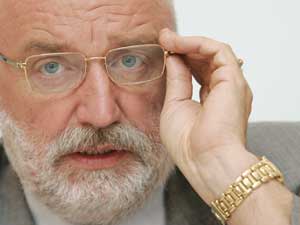President bemoans Latvia's fall as parties fight for power
 Riga - Former government coalition partners and opposition parties were jockeying for position in Latvia Monday following the resignation of incumbent prime minister Ivars Godmanis on February 20.
Riga - Former government coalition partners and opposition parties were jockeying for position in Latvia Monday following the resignation of incumbent prime minister Ivars Godmanis on February 20.
While Godmanis continued in a caretaker capacity, President Valdis Zatlers mulled the possible replacements nominated by each political party represented in Latvia's
100-seat parliament, the Saeima.
According to the Latvian constitution, which Zatlers himself has said requires overhauling to make it easier for the electorate to dissolve parliament, the collapse of one government does not lead to fresh elections.
"Unfortunately, the government can be formed only by those parties already represented in parliament," Zatlers said during a television interview on February 24.
"Unfortunately, it has to be admitted that in the past years the state has not been run too successfully ... No neighbouring country, no European Union member has experienced such a deep fall," said the president.
The largest single party, the People's Party (TP), was first to throw its hat into the ring when party leader Mareks Seglins announced that regional affairs minister Edgars Zalans would be their candidate.
Greens and Farmers' Union (ZZS) parliamentary chairman Augusts Brigmanis signalled that his preferred candidate would be Aivars Lembergs, mayor of the port city of Ventspils who is currently standing trial on charges of serious corruption, money-laundering and abuse of official power.
Other candidates have yet to step forward, but are rumoured to include at least one non-partisan figure who might be able to act as a unifying force.
But the Latvian public remains unimpressed with the political chicanery, according to a poll published in the Diena newspaper Monday which showed that of the four ruling coalition members, only the ZZS would pass the 5 per cent threshold needed to win seats in parliament.
The most popular party in the poll was the opposition Harmony Centre party (SC) which enjoys solid backing from Latvia's Russian- speaking minority.
Godmanis' decision to quit came after leaders of the TP and ZZS withdrew their support from the four-party ruling coalition just two weeks after they had backed him in a parliamentary no confidence vote.
In power since December 2007, Godmanis presided over a spectacular reversal in Latvia's economic fortunes with official sources saying gross domestic product (GDP) would decrease by 12 per cent this year, after years of breakneck growth.
In recent months, his government has sought a 7.5-billion-euro (9.5-billion-dollar) bail-out brokered by the International Monetary Fund and was forced to nationalize Latvia's second-largest bank, Parex Banka, to prevent its collapse.
Public anger at spending and wage cuts and a perceived lack of accountability from politicians led to riots in the streets of the Latvian capital, Riga, on January 13 and a blockade by farmers on February 3. (dpa)